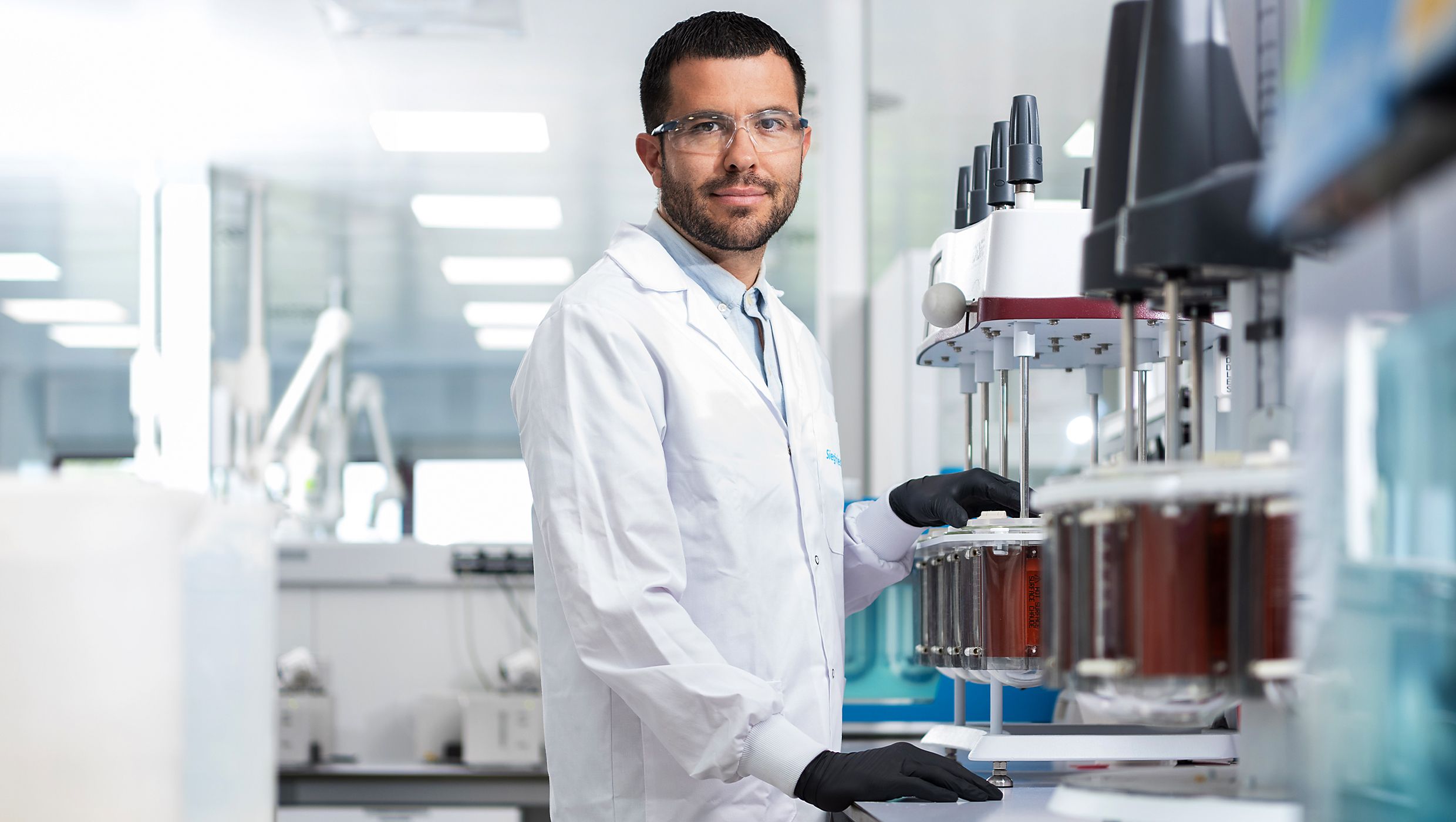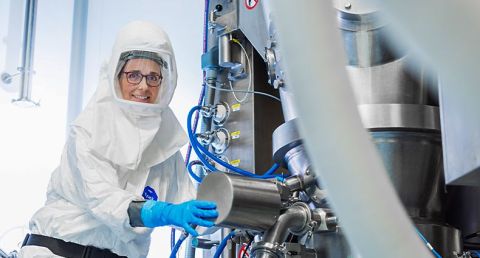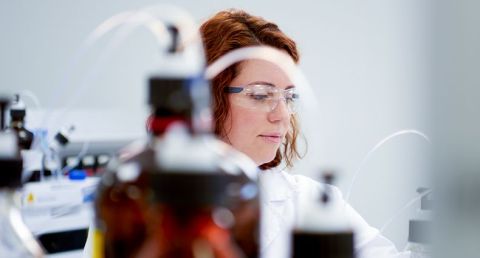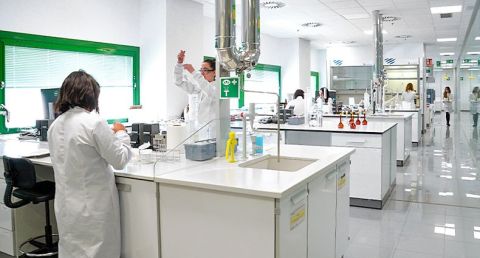Technologies
Our technical capabilities
Chemistry capabilities
Siegfried has a track record of more than 30 years in the CDMO business. More than 2,500 process evaluations and several hundreds of successful developed and scaled processes have been implemented. Siegfried has vast experience with reactions (> 200 chemical reaction types) from the following classes including scale-up of those reactions to commercial quantities with reactor sizes from 35 to 10,000l (total reactor volume 3000 m3):
- Homogeneous catalysis (e.g. Heck, Suzuki, organo-catalysis, chiral catalysis, enzyme-catalysis)
- C-Heteroatom bond forming reactions
- Pressurized reactions up to 60 bar (e.g. H2, CO, NH3)
- High potent compounds (1-10 µg/m3)
- Halogenations
- Phosgenations, Azidations
- Metalorganic chemistry
- Cryogenic reactions (temperature range -80 to +235°C)
- Reductions and oxidations
- Chiral resolutions
- Cyclizations
- Protecting group chemistry
- Reactions with special chemicals (e.g. hazardous reactions)
- Aromatic ring substitutions
- Long-chain chemistry (fatty acids, lipid-like)
Technology:
- Distillations <0.1 mbar – normal pressure
- Crystallization (Polymorphism)
- Process simulation
- Process safety
- Dedicated analytical development tools
- Membranes
- Flow
- Biocatalysis
- Route scouting/ early development/ next generation processes
- Process analytical technology
- Spray drying
- Drying/ milling/ micronization
Analytical services
Our analytical departments support the entire product life cycle of drug substances and drug products with scientific competence and an extensive instrument pool. Our core competencies are:
- Analytical method development
- Optimizing existing analytical methods to improve robustness and efficiency
- Analytical method validation, verification and transfer
- Release analysis of drug products, APIs, intermediates, raw materials, excipients and packaging material
- Container closure integrity testing (CCIT)
- Microbiological testing, microbial identification by MALDI-TOF
- Analytics for in-process control
- Analytics for cleaning validations and environmental monitoring
- Evaluation of purity profiles/ impurity tracking; determination of genotoxic impurities and nitrosamines
- Risk assessments and impurity control strategy for drug substance and drug products according to ICH Q3D
- Qualification of reference standards
- Development of specifications
- Stability studies:
- Stability studies for drug substances and drug products according to ICH requirements; performed in our own qualified stability chambers
- Compatibility studies of binary or complex mixtures of API(s) with excipient(s) performed to support early development phases
- Stress test/ forces degradation tests including photostability tests
- Technical capability for testing of inhalation devices: delivered dose uniformity, fine particle mass and aerodynamic particle size distribution
- Our state-of-the-art technical capabilities include, but are not limited to, 400 mHz NMR, Orbitrap-MS, XRPD and a wide variety of high-end equipment for standard applications.
Formulation technologies
Siegfried provides a wide range of technologies for making different types of dosage forms. With over 30 years of experience and a wide variety of products, we offer the following services to enhance our customers’ knowledge and innovation:
- API characterization
- Excipients and material compatibility
- API sterilization method (or adequate irradiation level)
- Pre-formulation for early safety studies
- Small scale formulation work
- Packaging screening for up-front stability
- Up-front stability testing
- Development and validation of analytical methods
- Validation of manufacturing process according to cGMP
- Process optimization
- Production and release of clinical trial material (CTM)
- Stability testing (ICH)
- Compilation of source documents for registration
- Regulatory support and advanced services
- Scale-up and technology transfer to the commercial site
Our advanced equipment and development department offer various technologies such as:
Oral solid dosage forms
- Wet bead milling
- Powder blending and mixing
- Wet granulation with high and low shear mixer
- Fluid bed spray granulation/ drying
- Roller compaction
- One-pot granulation
- Pellet extrusion and spheronisation (IR, DR, SR)
- Tablet compression (IR, SR, oral disintegrating tablets, minitablets)
- Coating (granules, pellets, tablets, IR, DR, SF)
- Hard capsule filling (granules, powder, pellets )
- Bilayer/ trilayer compression
- Blistering and bottling
- Printing on demand
- Automatic 100% visual inspection
Opthalmic dosage forms
- Ball milling
- Manufacturing tanks/r eactor for liquids, gels and ointments compounding
- Bottle aseptic filling line (round, oval and MDPF)
- Tube aseptic filling line for laminates and aluminum tubes
We also develop non-aseptic formulations such as creams, otic and nasal formulations.
Sterile parenteral liquid dosage forms
- Vials, cartridges, pre-filled syringes, ampoules
- Aseptic and terminally sterilized products
- Solution and suspensions
- Temperature sensitive drug products
High containment and high potency materials
APIs are becoming more potent with increased pharmacological activity, which brings potential health hazards for those handling these substances. To ensure the safety of employees, products, and the environment throughout development and production, special containment measures are essential.
Siegfried continually invests in containment technology, controls and the capability to safely handle such materials. We offer customers the capability for early stage development, scale-up and commercial manufacture of high-potency drug substance and drug products, with occupational exposure limits (OEL) as low as 0.1 μg/m3. With our combination of drug substance and drug product services, we offer complete integration and continuity of supply for your high potency products.
Our Zofingen, Evionnaz and Barberà del Vallès sites have dedicated high-containment facilities and production areas and follow core principles:
- Prioritize the safety of our employees
- Prevent cross contamination between products in a multi-use facility or with multi-use equipment
- Minimize exposure to harmful chemicals
- Offer comprehensive training to ensure that protective measures are correctly implemented
- Develop risk assessments and standard operating procedures for handling highly potent materials
- Utilize control measures, including engineering solutions, supplemented with personal protective equipment when necessary, following a risk-based approach.
Bridging technologies
Siegfried bridges the gap between bulk API production and drug formulation, providing the physical processing capabilities you require. We offer an array of equipment and technical expertise for crystallization, drying, and milling. Additionally, we can modify an API’s physical properties through spray drying and micronization to meet your needs.
We aim to be your world-class service partner in the development and manufacturing of particles, which are robustly designed to comply with the requirements and quality attributes for the final drug product.
Spray drying
Large-scale cGMP spray drying combines the setup of a chemical plant with pharmaceutical manufacturing standards. Siegfried’s extensive experience in drug production offers the capability and services your project requires.
- Capacity: Pilot Spray Dryer 125 m³ N2/h; Plant Spray dryer 400 kg N2/h
- Operating under full GMP in clean rooms (> 100’000 and 10’000 particles/ft³)
- Closed loop with Nitrogen; suitable for flammable solvents; infrastructure and license to operate with Hazardous Air Pollutant solvents like Dichloromethane
Download the factsheet below to learn more. Read the article on maximizing product potential through spray drying.
Milling and micronization
As milling and micronization are the last steps in manufacturing a bulk API, high c-GMP standards are essential. Siegfried offers milling and micronization services from lab to manufacturing scale. Classical milling is used to achieve a desired and standardized particle size for your down streaming process. This impacts flowability, compressibility, homogeneity and in some cases even bioavailability
Micronization reduces particle size below 20 micron. Micronization can be used to improve solubility/bioavailability by increasing the particle surface and solubility kinetics. For highly potent, low dose formulation, homogeneity is improved. PSD of a micronized product has no impact on your formulation.
Siegfried is expanding its Jet Mill capabilities to meet the demand for micronized APIs with very small particle sizes (below 10 µm). We use Design of Experiment and Quality by Design approaches to identify reliable parameters for micronization and milling. This helps achieve the desired particle size distribution, ensuring quality and consistency in collaboration with our customers. In Evionnaz, Siegfried has installed a fully automated micronization plant for high potent substances with gravimetric dosing and precise dispensing to the size you need for your downstream process.
Crystallization, precipitation, agglomeration
The crystalline form is the most common form of an API. Crystallization is the last step for your API. Crystallization is the most important step for purification and defines the purity profile of your API. Yield in the crystallization has a direct impact on costs and sustainability of your product. Solid properties like polymorphic form, particle size, morphology are constituted in the crystallization process. This may have an impact on flowability, product density, compressibility, stability and bioavailability.
Siegfried has significant experience in developing crystallization and precipitation processes. We use multiple techniques to evaluate solubility curves, design mass balance and oversaturation control models, so that we can optimize the crystallization. We use FBRM (Mettler particle beam former Lasentec) for online monitoring of particle size as well as in line measurements of e.g concentrations (IR, at line HPLC/NMR, Raman). For the characterization of the particles we have most state-of-the-art technologies available (e.g. Malvern, Sympatec Helos, Flow through microsopes, XRPD, TGA/DSC).
For downstream processes after the crystallization, sucha as filtration/centrifugation and drying, we have established our PhysOps toolbox. In this toolbox we combine standardized experiments with computer modelling tools to isolate finally the powder in the quality and with properties you ask for.
Cell and gene therapies
DINAMIQS, a Siegfried company, is a science-driven Contract Development and Manufacturing Organization offering end-to-end viral vector manufacturing solutions to accelerate gene therapy projects from DNA design to commercial scale. DINAMIQS offers a comprehensive and customized range of manufacturing services, process development, quality control and analytics solutions for genetic medicine companies.



